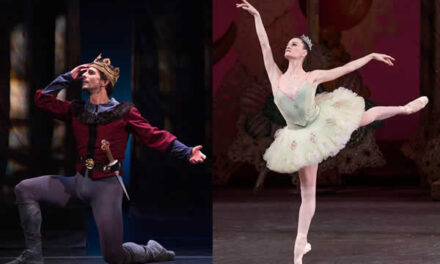Italian pianist Gloria Campaner, whose online bio tells us she was “born in the Venetian Islands,” played the fourth recital (of five) in this year’s Paderewski Festival before a demonstrably appreciative audience in historic Smedes Parlor at Saint Mary’s School on a brisk Saturday afternoon. The venue is one of the capital’s great treasures, and the fact that it was constructed in the last years of Chopin’s life never fails to elicit comments from the presenters of this distinguished festival, now concluding its sixth season.
The somewhat enigmatic headline refers to the multitude of short pieces played on this occasion. Campaner’s program consisted of two major works – Schumann’s Kinderszenen, Op. 15 (1838), a set of 13 short, contrasting sections, plus Chopin’s 24 Preludes, Op. 28 (1839). There were also, as it turned out, two encores – Chopin’s Prelude in C Sharp minor. Op. 45 (1841; not part of the set), and Paderewski’s Krakowiak in F, Op. 9, No. 1 (1886; it’s the first of 6 Polish Dances published in two small volumes in 1886). That’s a lot of little pieces of music, so keeping everything distinctly characterized was no mean feat. Campaner proved more than equal to the task, turning in a stunning afternoon of music, beautifully realized, and concurrently a brilliant display of the highest imaginable levels of pianistic artistry. She’s good. She’s very, very good.
The Schumann was a special treat, for the components of this collection are more often heard as isolated bits than performed together by an artist of Campaner’s caliber. The best-known number is the famous “Träumeri,” beloved by music lovers all over the world but also remembered (perhaps with somewhat less fondness) for being pressed into service as the unending music heard at Lenin’s tomb. Other parts of the score are also quite well known, including the concluding “Der Dichter spricht,” played as an encore by Hubert Rutkowski at the first of this year’s festival recitals. Campaner seemed totally absorbed in the music, realizing it in ways often magical and sometimes quite unexpectedly so. In the process she underscored (no pun intended) the manic nature of these pieces (the composer suffered from what we now call bipolar disorder). The audience seemed as absorbed as the artist herself, listening in rapt silence with complete attention. There was warm, sustained applause at the end.
Part two was devoted to the Chopin Preludes, likewise realized with total commitment and delivered with keen, sometimes breathtaking insight. That Campaner had clearly delved deeply into this music was constantly evident. What was totally unanticipated was that, heard immediately after the Schumann, we became aware of Chopin’s often manic approach to the arrangement of these preludes as published – the contrasts were, like so much of Schumann’s music, often mercurial, and as played here, a certain level of mania was evident more often than not as the numbers unfolded. None of this distracted from the sheer beauty of the music or the artist’s playing thereof – the more familiar numbers (again, these things are heard fairly often as individual concert selections or encores, less frequently in one big gulp, as on this occasion) were often radiant in their immediacy and impact, while the lesser-known ones tended to emerge as jewels newly rediscovered. The range of projected emotions was wide, as well. The traversal of these pieces was, in a word, stunning.
And the crowd knew it was very special, so waves of applause issued from the standing attendees, resulting in the two aforementioned encores. It was singularly appropriate to hear that late Prelude as an appendage to the others. And likewise it was a wonderful cap to the Paderewski Festival’s penultimate concert to be blessed with such a memorable rendition of the great Polish dance known as the Krakowiak, heard in one of Paddy’s own settings. Maybe every concert should include at least one token piece by the grand namesake of the festival.
Three cheers!
The festival concludes at 3 p.m. on Nov. 10 in the same venue with a recital by Jakub Kuszlik. For details, including the program, see the sidebar.
***
Incidentally, the handsome program booklet – a keeper, as all of these have been, over the years, despite its absence of notes on the music being performed – includes translations of Franco-Swiss pianist Alfred Cortot‘s alternative names for the 24 preludes – names that, once read, will in perhaps more than a few cases be very hard to un-remember! Cortot’s first complete recording of the preludes – his most straightforward version, made in 1926 – is here.)
And one final note: As indicated by the organizers, this year’s festival is in effect a mini-celebration of Schumann, since we heard the Fantasie, Op. 17, on Oct. 22, the Fantasiestücke, Op. 12, on Nov. 2, and the Kinderszenen, Op. 15, on this program, and we will have the Kreisleriana, Op. 16, on the last installment, Nov. 10.













